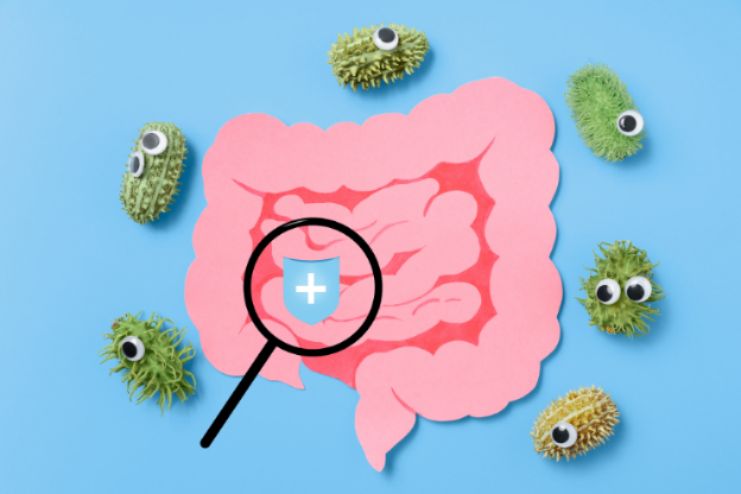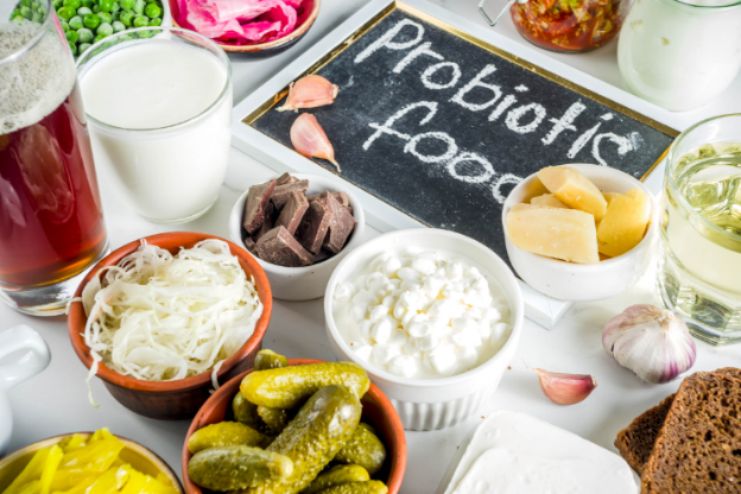Affiliate Disclaimer
Some links in this article are affiliate links. We may earn a small commission if you make a purchase through these links, at no extra cost to you. We only recommend products we find useful to our readersIf you suffer from digestive issues such as bloating, diarrhea, or constipation, or if you have been feeling tired or experiencing brain fog lately, you may be experiencing leaky gut syndrome or simply a leaky gut.
We have been hearing about leaky gut syndrome recently. It has become a popular topic in gut health and wellness, but it amazes us if we can fix leaky gut naturally. The idea behind a leaky gut is that toxins, undigested food particles, and bacteria leak into the bloodstream due to a compromised intestinal lining.
As we become more aware of our gut health, people have noticed natural ways of healing. These often include dietary adjustments, lifestyle changes, or even supplements to heal leaky gut naturally.
While the medical fraternity has not entirely favored leaky gut being a universal condition, a few studies support this idea. Research supports the notion that gut permeability issues are linked to conditions like irritable bowel syndrome (IBS), autoimmune diseases, and chronic inflammation. This article lets us understand the science behind the leaky gut, its symptoms, and practical strategies to heal it naturally.
Read More: 10 Signs Your Gut Health Needs Your Attention (And How To Fix It)
What Is Leaky Gut Syndrome?

A leaky gut can be highly uncomfortable and disrupt many people’s daily lives. Leaky gut syndrome refers to the concept of intestinal permeability. In this, the small intestine’s lining becomes damaged, leading to gaps in the intestinal walls. These gaps make it easier for harmful substances to enter the bloodstream. These substances can include bacteria, toxins, or even undigested food particles, triggering discomfort and negatively affecting gut health.
A weak gut barrier leads to an increased risk of various chronic conditions, including:
- Irritable Bowel Syndrome (IBS): Intestinal permeability impacts digestion and causes symptoms such as bloating, diarrhea, or stomach cramps.
- Autoimmune Diseases: The risk of autoimmune conditions increases due to intestinal permeability. This is when the immune system mistakenly attacks healthy tissues.
- Food Sensitivities: Intestinal permeability or leaky gut can lead to harmful substances entering the bloodstream and food sensitivities in certain people.
While digestive issues are the most common signs of a leaky gut, the symptoms can extend beyond the gastrointestinal tract. These include:
Digestive Symptoms
A leaky gut has a few significant symptoms that impact your everyday life. If you feel that a leaky gut is something that you’re facing, here are a few symptoms to check:
- Bloating: Bloating is when you feel full or tight in your stomach after meals. It is extremely uncomfortable and can disturb most people’s daily activities.
- Diarrhea: If you suffer from frequent loose stools, it may signal a leaky gut.
- Constipation: Many people also experience constipation, which makes it difficult to pass stools. These irregular bowel movements are an indicator of a leaky gut.
- Gas: Frequent and excessive burping or flatulence is a common sign of having a leaky gut.
Non-Digestive Symptoms
Apart from the digestive symptoms, a few non-digestive signs can help you assess whether you have a leaky gut issue.
- Fatigue: If you are constantly tired or have low energy levels all the time, even after having ample rest, it might mean you have inflammation due to a leaky gut.
- Brain Fog: It’s not just physical fatigue; a leaky gut might also exhaust you mentally. You might find it challenging to concentrate and have memory problems and brain fog if you are suffering from a leaky gut.
- Joint Pain: Since a leaky gut causes inflammation, you might also experience joint discomfort and stiffness.
- Skin Issues: A leaky gut triggers the immune system, causes inflammation, and leads to various skin issues such as eczema, acne, or psoriasis.
If these symptoms persist or worsen, seeking medical advice is essential to identify the underlying causes and determine if a leaky gut is a factor.
Read More: 9 Ways To Heal Leaky Gut – Fix Part Of Your Digestive System.
The Science Behind Leaky Gut: What Do Studies Say?

As mentioned earlier, the medical community has varied views on leaky gut syndrome. The growing research suggests intestinal permeability plays a role in various chronic conditions, including Inflammatory Bowel Disease (IBD), Irritable Liver Disease (ILD), Steatohepatitis, nonalcoholic fatty liver disease, and more. The gut lining consists of tight junctions that help control substances entering the bloodstream. A leaky gut is when these junctions become loose, and unwanted particles like toxins, bacteria, and undigested food leak into the blood.
Recent studies also show the connection between gut permeability and health conditions such as irritable bowel syndrome (IBS), autoimmune diseases, and metabolic disorders. Understanding what influences gut permeability can help identify effective strategies for healing it naturally.
The Role of Gut Microbiome Imbalance and Inflammation
We all know that the gut microbiome consists of diverse good bacteria that promote digestion, immunity, and gut health. However, if you have a poor diet or face chronic stress, harmful bacteria find an easy way to enter the bloodstream. This weakens the gut lining, causing inflammation.
- Dysbiosis and Gut Permeability: Studies suggest that dysbiosis,an imbalance in gut bacteria, can contribute to increased intestinal permeability, allowing harmful substances to pass through the gut lining.
- Inflammatory Response: When unwanted particles enter the bloodstream, the immune system responds with inflammation, contributing to digestive issues, joint pain, and neurological symptoms like brain fog.
What Research Says About Gut Permeability and Disease Connections

While there is ongoing research about gut permeability and its relation with diseases, a few studies suggest that high intestinal permeability is linked to several chronic conditions, including:
- IBS & Digestive Disorders: Many irritable bowel syndrome (IBS) patients show signs of weak intestinal permeability, suggesting a connection between the two.
- Autoimmune Diseases: Increased gut permeability can lead to celiac disease, Crohn’s disease, and rheumatoid arthritis. These autoimmune diseases have been associated with leaky gut syndrome, suggesting that an impaired gut barrier may contribute to immune system dysfunction.
- Food Sensitivities & Allergies: When undigested proteins enter the bloodstream due to a weakened gut barrier, the immune system may recognize them as threats, potentially leading to food intolerances and allergic reactions.
Controversies: Is “Leaky Gut” a Real Diagnosis or Just a Symptom of Other Conditions?
The debate is that increased gut permeability is often a symptom of underlying issues like chronic inflammation, infections, or dietary changes and not the root cause of the problem.
However, it is observed that improving gut health through diet and lifestyle changes can significantly improve overall well-being.
Diet Changes for Gut Repair

Food can either make or break your gut health or, in fact, your overall well-being. If you are looking for ways to heal a leaky gut naturally, make a gut-friendly diet your best friend.
Focus on a diet rich in anti-inflammatory and gut-healing foods, which help restore gut barrier strength while promoting the growth of good bacteria. Avoid processed and inflammatory foods, as they weaken the intestinal wall and delay healing.
Anti-Inflammatory Foods
Include anti-inflammatory foods that help reduce irritation in the intestinal lining and promote healing. These foods provide our body with essential nutrients, amino acids, and compounds that support gut barrier function and help maintain microbiome balance.
- Bone Broth: If you do not have any diet preferences or restrictions and eat non-vegetarian food, bone broth is a good option for healing a leaky gut. It is packed with collagen, gelatin, and amino acids like glutamine and helps repair the intestinal lining by reducing inflammation and strengthening the intestinal wall.
- Fermented Foods: Including probiotic-rich foods such as kimchi, sauerkraut, kefir, and yogurt, help promote good gut bacteria that play a crucial role in maintaining balanced gut health.
- Fiber-Rich Foods: Whole grains, legumes, fruits, and vegetables provide prebiotic fiber that nourishes good gut bacteria, enhances digestion, and helps maintain a strong gut lining.
Foods to Avoid

Certain foods must be avoided if you’re looking to heal a leaky gut naturally. These can worsen leaky gut by increasing inflammation, irritating the intestinal lining, or disturbing the gut microbiome. Limiting these foods can help in faster healing:
- Processed Sugar: High sugar intake leads to excessive growth of harmful gut bacteria and yeast, which in turn leads to an imbalance in the gut microbiome.
- Gluten: If you are sensitive to gluten, wheat must be avoided. Gluten can trigger an inflammatory response that makes the intestinal lining weak.
- Dairy: People with dairy intolerance find it hard to digest dairy. This leads to gut inflammation and worsens leaky gut syndrome.
- Artificial Additives: Preservatives, artificial sweeteners, and food colorings can disrupt the gut microbiome and trigger inflammation, making it harder for the gut to heal.
Key Nutrients & Supplements

Leaky gut can be healed naturally with diet; however, certain nutrients and supplements can provide extra support. These not only help repair the intestinal lining but also restore the gut flora balance.
Probiotics & Prebiotics
A healthy gut microbiome is essential for maintaining a strong gut barrier. Probiotics introduce good bacteria, while prebiotics feed these good bacteria.
- Probiotics: Live bacteria strains, such as Lactobacillus and Bifidobacterium,help restore microbiome balance, reduce gut inflammation, and support immune function.
- Prebiotics: Found in foods like onions, garlic, asparagus, and bananas, prebiotics fuel beneficial gut bacteria, promoting a healthy intestinal lining and better digestion.
Read More: Why Probiotics Might Not Work Without Prebiotics.
Supplements for Gut Repair

Certain supplements provide targeted nutrients that help strengthen the gut lining and reduce inflammation, aiding natural healing.
- L-glutamineis an essential amino acid crucial in repairing damaged intestinal wall lining and helping keep it strong.
- Collagenhelps replenish the integrity of your intestines and contains proline and glycine, two amino acids that are exceptionally beneficial in healing a leaky gut.
- Zinc: Zinc supplementation helps to strengthen the gut lining in patients with Crohn’s disease. Research suggests that zinc can modify the tight junctions of the intestinal lining, helping to limit gut permeability.
- Omega-3 Fatty Acids: Fish oil and flaxseeds contain omega-3 fatty acids, which have powerful anti-inflammatory properties that help calm gut inflammation and promote healing. They also help decrease intestinal permeability by increasing good bacteria and decreasing the bacteria that cause leaky gut.
- Polyphenols– In foods like berries, green tea, and olive oil, polyphenols support beneficial gut bacteria while reducing oxidative stress and inflammation.
Read More: The Role Of Gut Health In Diabetes Development.
Lifestyle Changes for a Healthy Gut

Beyond diet and supplements, lifestyle habits are crucial in maintaining gut health. Chronic stress, poor sleep, or overuse of antibiotics can weaken the gut lining and disrupt the microbiome. Implement positive lifestyle changes that improve gut healing.
● Stress Management:
Chronic stress can harm gut health by increasing inflammation and causing dysbiosis. You can manage stress with a few relaxation techniques, such as mindfulness or meditation, deep breathing, or yoga.
● Regular Exercise:
Ensure you engage in regular physical activity, as it leads to better digestive health. For this, you can try aerobic exercises like walking, cycling, or jogging. If you do strength training, focus on building muscle mass, which helps regulate metabolism.
● Sleep Hygiene:
Poor sleep quality is linked to increased gut permeability and inflammation. To heal the leaky gut faster, focus on getting ample rest. Aim for at least 7-8 hours of sleep and maintain a consistent sleep schedule.
● Hydration & Gut Health:
Staying hydrated is essential for digestion, nutrient absorption, and maintaining healthy gut lining. Drink plenty of water to support gut health and prevent constipation. Limit alcohol and caffeine intake, as they can irritate the gut lining and cause an imbalance in the gut microbiome.
● Post-Antibiotic Gut Recovery:
If you have been using antibiotics, it becomes essential to restore gut balance afterward. To help promote good bacterial growth, include probiotics after a course of antibiotics. You can also eat fermented foods to aid digestion.
Read More: 10 Mistakes To Avoid When Trying To Improve Your Gut Health.
Final Thoughts
While leaky gut remains a debated topic of ongoing research, we can quickly restore gut health naturally with a few science-backed strategies. Including a balanced diet rich in gut-healing foods, targeted supplements, and healthy lifestyle habits can improve the intestinal wall and maintain overall gut health. Always consult a healthcare professional before making significant dietary changes or starting supplements.
Focusing on gut health through natural approaches can promote digestion, improve immunity, and reduce chronic inflammation, all of which are key steps toward overall wellness.
Take charge of your gut health, and say hello to an improved overall well-being today!
In this Article

















